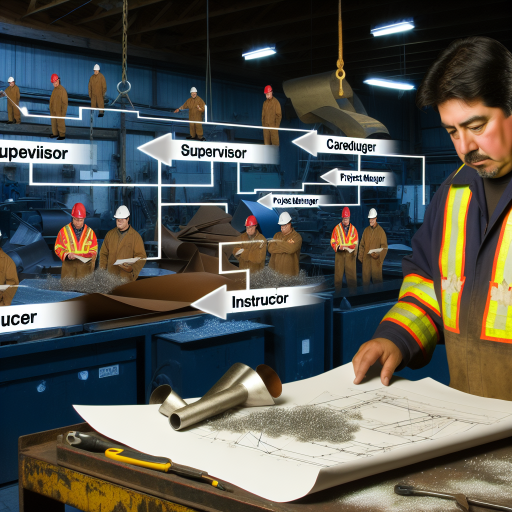Overview of the Ironworker Profession
The ironworker profession is vital to infrastructure development.
Ironworkers erect steel frameworks for buildings and bridges.
They also install reinforced steel bars in concrete constructions.
This profession combines skilled labor with physical strength and precision.
Nature of Work
Ironworkers engage in various tasks on construction sites.
They read blueprints to understand project specifications.
Moreover, they operate machinery to lift heavy steel components.
Safety is a primary concern in this physically demanding job.
Training and Education
Most ironworkers complete apprenticeships for hands-on experience.
Training programs typically last three to four years.
These programs provide opportunities to learn from experienced professionals.
Safety training is also an essential part of the curriculum.
Career Pathways
Ironworkers have multiple pathways for career advancement.
Some choose to specialize in welding or steel erection.
Others may advance to supervisory or managerial roles.
Continuing education enhances skills and opens up new opportunities.
Job Outlook and Opportunities
The demand for skilled ironworkers remains strong in many regions.
Growing infrastructure projects drive job opportunities.
Additionally, advancements in technology require skilled workers.
Ironworkers can expect competitive salaries as they gain experience.
Key Skills Required for Career Advancement in Ironworking
Technical Skills
Ironworkers must possess strong technical skills to excel in their craft.
Understanding blueprints and technical drawings is essential.
Proficiency in using heavy machinery enhances productivity.
Additionally, knowledge of welding techniques is crucial.
Physical Endurance
Ironworking is a physically demanding profession.
Unlock Your Career Potential
Visualize a clear path to success with our tailored Career Consulting service. Personalized insights in just 1-3 days.
Get StartedWorkers need to maintain excellent physical fitness.
Strength and stamina are vital for handling heavy materials.
Moreover, agility helps navigate challenging work environments.
Safety Awareness
Safety is paramount in the ironworking profession.
Ironworkers must understand and follow safety regulations.
Proper use of personal protective equipment is necessary.
Furthermore, awareness of potential hazards is critical.
Problem-Solving Abilities
Effective problem-solving skills are essential for ironworkers.
Workers often face unexpected challenges on the job site.
They must quickly assess situations and devise solutions.
This skill not only enhances safety but also boosts efficiency.
Communication Skills
Strong communication skills facilitate teamwork in ironworking.
Ironworkers must effectively communicate with colleagues and supervisors.
Clear communication prevents mistakes and enhances collaboration.
Additionally, it fosters a positive work environment.
Continuous Learning
The ironworking profession requires a commitment to continuous learning.
Staying updated on industry trends and technologies is vital.
Participating in training programs enhances skill sets.
Ultimately, this fosters career growth and advancement opportunities.
Educational Pathways and Certifications for Ironworkers
Overview of Educational Requirements
Ironworkers typically need a high school diploma or GED.
Additionally, completing an apprenticeship is essential for practical skills.
Higher education can enhance job prospects in this field.
Apprenticeship Programs
Apprenticeships provide hands-on experience in ironworking.
These programs combine classroom instruction with on-the-job training.
Programs often last three to four years, depending on the state.
Participants learn about safety, blueprints, and welding techniques.
Union programs may offer more resources and networking opportunities.
Certification Options
Certifications enhance an ironworker’s credibility and expertise.
Many organizations offer specialized certifications for ironworkers.
Common options include the National Commission for the Certification of Crane Operators.
Additional certifications focus on specific skills relevant to the job.
Continuing Education and Training
Continuing education is important for ironworkers to remain competitive.
Workshops and training sessions can improve existing skills.
Online courses provide convenient options for further learning.
Employers often support ongoing training to enhance workforce skills.
Staying Updated on Industry Standards
The ironworking field evolves with new techniques and technologies.
Staying informed about industry standards is crucial for safety.
Regular attendance at industry conferences benefits professional development.
Networking with peers can provide insights into emerging trends.
See Related Content: Exploring the Job Market for HVAC Technicians in Canada
Apprenticeship Programs and Their Role in Career Growth
Introduction to Apprenticeship Programs
Apprenticeship programs serve as a gateway for aspiring ironworkers.
They combine practical training with classroom instruction.
Many programs last three to four years, allowing hands-on experience.
Participants learn essential skills critical for the profession.
Benefits of Apprenticeship Programs
These programs offer numerous advantages for career development.
Firstly, apprentices earn while they learn, reducing financial burdens.
Secondly, they gain valuable experience directly on job sites.
Thirdly, apprentices build a network with industry professionals.
This connections can lead to future job opportunities.
Types of Apprenticeship Programs
There are various types of apprenticeship programs available.
Union-sponsored programs are popular, offering extensive training.
Non-union options also exist, catering to different preferences.
Both types ensure comprehensive skill development.
Eligibility and Enrollment Process
Eligibility criteria vary, but common requirements exist.
A high school diploma or equivalent often serves as a baseline.
Prospective apprentices may need to pass physical fitness assessments.
Enrollment usually involves submitting an application and interview.
Support During Apprenticeship
Support systems play a crucial role during apprenticeship.
A mentor can provide guidance throughout the process.
Access to resources and additional training enhances knowledge.
Moreover, peer support fosters camaraderie and collaboration.
Long-term Career Growth
Successful completion of apprenticeships leads to numerous opportunities.
Apprentices can secure permanent positions within companies.
Additionally, they can pursue certifications to advance their careers.
Experienced ironworkers often move into supervisory roles.
Ultimately, continuous learning remains essential for professional growth.
Find Out More: Finding Entry-Level Metal Fabrication Jobs in Canada
Networking Opportunities within the Ironworking Community
Importance of Networking
Networking plays a crucial role in career advancement.
It helps ironworkers connect with peers and industry leaders.
By networking, professionals can share valuable experiences and insights.
Moreover, networking opens doors to potential job opportunities.
Industry Events and Conferences
Attending industry events is one effective strategy for networking.
Numerous conferences focus on ironworking and construction technologies.
For instance, the International Ironworkers Conference attracts many professionals.
Such events provide opportunities to build relationships and learn new skills.
Trade Associations and Organizations
Joining trade associations can significantly enhance networking efforts.
Organizations like the Iron Workers Union promote professional development.
These associations often host workshops, seminars, and social events.
Members gain exclusive access to training and resources too.
Online Networking Platforms
Social media and online platforms offer additional networking opportunities.
For example, LinkedIn is a powerful tool for connecting with industry professionals.
Joining relevant groups can lead to discussions and collaborations.
Additionally, online forums dedicated to ironworking facilitate knowledge sharing.
Mentorship Programs
Participating in mentorship programs can provide invaluable guidance.
Experienced ironworkers often offer insights to newcomers.
Mentorship can establish meaningful connections that benefit both parties.
It also fosters a culture of support and continuous learning.
Local Community Involvement
Engaging with the local ironworking community enhances networking efforts.
Volunteering for community projects showcases skills and dedication.
Moreover, it provides a platform to meet local professionals.
Such involvement builds strong relationships within the industry.
Uncover the Details: Exploring Advanced Techniques in Modern Bricklaying
Potential Career Specializations in Ironworking
Structural Ironworking
Structural ironworkers focus on constructing steel frameworks for buildings.
They work on bridges, skyscrapers, and various infrastructure projects.
This specialization requires strong knowledge of steel assembly techniques.
Additionally, precision and attention to safety are crucial in this field.
Ornamental Ironworking
Ornamental ironworkers create decorative metal elements for structures.
Their work includes railings, gates, and intricate facade details.
Artistic skills and craftsmanship are essential in this specialization.
Moreover, they often collaborate with architects and designers.
Reinforcing Ironworking
Reinforcing ironworkers install steel bars and mesh to strengthen concrete.
This role is vital in ensuring the integrity of buildings and roads.
They must understand structural requirements and load factors.
Furthermore, they adhere strictly to building regulations and codes.
Demolition Ironworking
Demolition ironworkers dismantle old structures safely and efficiently.
They use specialized tools and techniques to manage risks.
Knowledge of building systems aids in safely removing materials.
Importantly, they also ensure waste is disposed of properly.
Safety Experts
Ironworking safety experts focus on maintaining workplace safety standards.
They conduct training sessions and ensure compliance with regulations.
Moreover, they assess job sites for potential hazards regularly.
These experts play a crucial role in reducing workplace accidents.
Delve into the Subject: Challenges and Rewards of an Ironworker’s Career

Understanding the Job Market and Demand for Ironworkers
Current Industry Landscape
The ironworker profession plays a vital role in construction and infrastructure development.
They are essential for erecting steel structures and reinforcing concrete frameworks.
According to industry reports, the demand for ironworkers continues to grow.
Construction projects across the nation require skilled labor in this field.
Increasing Infrastructure Investments
Government initiatives have led to increased funding for infrastructure projects.
This investment creates numerous job opportunities for ironworkers.
States are focusing on upgrading roads, bridges, and public buildings.
Such projects create an ongoing need for skilled ironworkers to meet construction demands.
Impact of Technological Advancements
Advancements in technology also influence the ironworking profession.
Modern tools and techniques enhance safety and productivity on job sites.
Ironworkers who adapt to these changes have a competitive advantage in the job market.
Training in new technologies is crucial for career development.
Trends in Labor Demand
The construction industry is experiencing a shortage of skilled labor.
Many experienced ironworkers are retiring, creating gaps in the workforce.
Younger workers are encouraged to join this rewarding profession.
There are various programs designed to attract new talent to the field.
Employment Opportunities and Job Security
Job security in the ironworking profession remains strong.
Ironworkers can find employment in various sectors, including commercial and residential construction.
Furthermore, many employers offer benefits and competitive salaries.
Career advancement opportunities are abundant for those willing to learn and grow.
Impact of Technological Advancements on Ironworker Roles
Integration of Advanced Tools
Modern ironworkers utilize advanced tools for increased precision.
This technology enhances speed and efficiency on job sites.
For instance, robotic systems assist in repetitive tasks.
Laser cutting tools offer accuracy beyond manual methods.
Consequently, workers can focus more on complex tasks.
Training and Skill Development
Technological advancements demand continuous training for ironworkers.
Employers now prioritize ongoing education for their teams.
New programs teach skills for operating sophisticated machinery.
This focus on skill development keeps the workforce competitive.
As a result, workers who adapt may advance more rapidly.
Remote Monitoring and Safety
Technology enhances safety measures in the workplace.
Remote monitoring systems track worker health in real-time.
These systems prevent accidents by addressing issues promptly.
Furthermore, digital checklists streamline safety protocols.
Such innovations ultimately create a safer working environment.
Collaboration and Communication Tools
New communication tools foster better collaboration among teams.
Project management software helps ironworkers stay organized.
Through these platforms, teams can share updates instantly.
This leads to improved workflow and fewer misunderstandings.
Such enhancements ensure projects stay on schedule and budget.
Safety Training and Its Importance in Career Development for Ironworkers
Understanding Safety Training
Safety training equips ironworkers with essential skills.
It covers hazards and proper safety protocols.
Through training, workers learn to recognize potential dangers.
Additionally, they understand the importance of risk management.
Benefits of Safety Training
Effective safety training helps reduce workplace accidents.
This leads to fewer injuries and fatalities on the job site.
Moreover, it fosters a culture of safety among workers.
Consequently, companies can improve their overall productivity.
Importantly, well-trained workers boost their employability.
Employer Support for Training Programs
Many employers provide safety training programs for their workers.
Companies like SteelWorks Industries prioritize safety training.
They often partner with local trade unions for effective training.
This collaboration ensures comprehensive education on safety measures.
Advancement Through Certification
Obtaining safety certifications opens doors for career growth.
Certifications demonstrate a commitment to safety excellence.
Consequently, they make ironworkers more competitive in the job market.
Additionally, certifications can lead to supervisory roles.
Many employers prefer certified personnel for advanced positions.
Continuous Learning and Skill Development
Safety training is not a one-time event.
It requires ongoing education to keep skills current.
Workers should regularly attend workshops and refresher courses.
Opportunities for continuous learning contribute to career longevity.
Ultimately, they ensure ironworkers stay relevant in their field.
Success Stories: Profiles of Prominent Ironworkers and Their Career Journeys
Introduction to Ironworker Success
The ironworker profession offers numerous paths to success.
Many professionals in this field have inspiring stories to share.
Understanding these journeys can motivate newcomers.
Profile of Maria Gonzalez
Maria Gonzalez started her career as an apprentice ironworker.
Her determination set her apart from the beginning.
She worked on large construction projects in downtown Chicago.
Maria quickly moved up to a foreman role within five years.
She now leads a diverse team of ironworkers.
Maria advocates for women in construction industries.
Her success story inspires many to pursue ironworking careers.
Profile of James Carter
James Carter took a different path to success.
He began as a laborer before transitioning to ironwork.
His commitment to learning new skills impressed his supervisors.
After several years, he earned his welding certification.
James now runs his own ironwork company in Texas.
His journey demonstrates the importance of continuous education.
Profile of Aisha Thompson
Aisha Thompson faced significant challenges as a young ironworker.
She was often the only woman on her construction sites.
Her resilience helped her gain respect among her peers.
Aisha eventually became a project manager for a major firm.
She leads projects that focus on sustainable building practices.
Aisha emphasizes mentorship for young women interested in the field.
Industry Impact of Ironworker Success Stories
These stories highlight the diverse pathways available in ironworking.
They reflect how determination and skill can lead to success.
Moreover, they demonstrate the changing dynamics in this profession.
Ironworkers play a vital role in shaping our infrastructure.
As role models, they inspire future generations to join the trade.
Each successful ironworker contributes to a stronger, more inclusive industry.
Additional Resources
Home : Occupational Outlook Handbook: : U.S. Bureau of Labor …
In general, is being an elevator mechanic a good job? : r/Elevators




